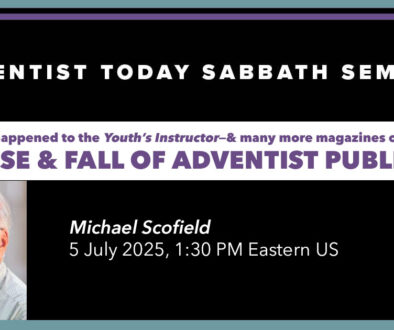When does the Sabbath start?
12 July 2023 |
Dear Adventist Today,
My thanks and admiration to Carsten Thomsen for having the temerity to pop the lid of Pandora’s box and take a Magellanic expedition across bumpy datelines while strictly observing the Sabbath rulebook. While edible and romantic dates might be less controversial, Carsten’s magisterial explication of the problem can only be admired. After all, someone has to draw the line.
Or do they?
It unlimbered my memory.
In the 1960s I was visiting my parents, who had retired to Carmel Valley, California. One weeknight my father invited me to join him at the Pacific Grove church, where he and the pastor were conducting a Five-Day Plan to Stop Smoking. There I met the young pastor, who had a burden to straighten out a perceived aberration in Sabbath observance in the Adventist Church. He gave me a copy of his thesis that would explain it all.
As indeed it did.
His thesis went something like this: At the end of the Creation Week in the Garden of Eden, God perceived that a day of rest would be beneficial, so He proclaimed the seventh day to be a perpetual Sabbath. Since the Garden of Eden is generally accepted to be in the region of Mesopotamia (modern-day Iraq?), that is where the Sabbath day begins. Then as the Earth rotates on its axis, day moves westward. To Spain, to North America, to Hawaii, to Japan, to India and then back to Mesopotamia. Impeccable logic, astronomically speaking, as nearly as I could discern it.
But with the invention by humanity (or was it the devil?) of the International Dateline, a day now begins somewhere west of the meandering dateline in the central Pacific. Meaning that the Asiatic peoples would be keeping the Sabbath before God had invented it. Not to be tolerated! Adventists in Japan, China, and India should wait a day until the Sabbath reached them instead of jumping the gun, so to speak. In other words, they should properly be worshipping on Sunday.
In Asia: the “Seventh-day-on-Sunday Adventist Church”
Well, then. That leads to further devious thoughts. Somewhere I had heard that someone had the gall to ask Ellen White what Adventists should do if they lived in Narvik, Norway, above the Arctic Circle, where sunsets may not happen every 24 hours. Her answer, supposedly: “Adventists shouldn’t live in Narvik.” (Apocryphal, I assumed; but maybe not, said an Adventist theologian.)
But now that we are careening madly down this slippery slope, here is another idea. If the Sabbath was created in the Garden of Eden in Mesopotamia, then maybe that is when the Sabbath is. Everywhere. It may be 12 hours different in California but, hey, that’s what we get for living on a roundish world. And should it surprise anybody if, while it is bright light in Iraq, Adventists in California are in the dark?
Everybody could then know when it was Sabbath. Even an astronaut. (If bicycles and airplanes were not to be tolerated, what would Ellen White think of space stations?)
Then another thought wandered into my porous brain. According to Genesis, God worked hard for six days to create the world and everything in it. Exhausted, He declared a day of rest on the seventh day. But was God Himself exhausted? Or was He thinking more of man? After all, wasn’t the Sabbath made for man and not man for the Sabbath? So was the particular day supreme? Or was the necessity of periodic rest for hardworking humans the important principle? After all, even the most legalistic Adventists believe hospitals should stay open for business on the Sabbath. Also the utility companies that supply the gas and electricity and water and communications that our churches use. Also the police and firefighters that protect us. And do our preachers work on the Sabbath?
The world goes round and round. Does our legalistic logic also go in circles?
Enlighten me, Carsten.
Gordon Short




